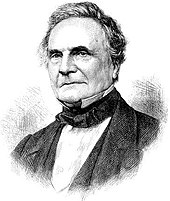Charles Babbage
Apariencia
| Charles Babbage | |||||||||||
|---|---|---|---|---|---|---|---|---|---|---|---|
 «Los números son los amos de los débiles, pero los esclavos de los fuertes». |
|||||||||||
| Véase también | |||||||||||
| Esta página contiene citas de una persona fallecida hace 154 años. | |||||||||||
Charles Babbage (Teignmouth, Devonshire [o Londres]; 26 de diciembre de 1791 – Londres, 18 de octubre de 1871) fue un matemático ingeniero e inventor inglés.
Opiniones y anécdotas
[editar | editar código]- «Cada vez que un hombre puede obtener números, son invaluables: si son correctos, ayudan a informar su propia mente, pero son aún más útiles para engañar las mentes de los demás. Los números son los amos de los débiles, pero los esclavos de los fuertes».[Whenever a man can get hold of numbers, they are invaluable: if correct, they assist in informing his own mind, but they are still more useful in deluding the minds of others. Numbers are the masters of the weak, but the slaves of the strong].[1]
- «El conocimiento científico apenas existe entre las clases superiores de la sociedad. La discusión en la Cámara de los Lores o de los Comunes, que surge ante la aparición de cualquier tema relacionado con la ciencia, prueba suficientemente este hecho». [Scientific knowledge scarcely exists amongst the higher classes of society. The discussion in the Houses of Lords or of Commons, which arise on the occurrence of any subjects connected with science, sufficiently prove this fact]. [2]
- «En dos ocasiones, me preguntaron [miembros del Parlamento]: 'Sr. Babbage, si ingresa cifras incorrectas en la máquina, ¿saldrán las respuestas correctas?' No puedo percibir correctamente el tipo de confusión de ideas que podría provocar tal pregunta». [On two occasions, I have been asked [by members of Parliament], 'Mr. Babbage, if you put into the machine wrong figures, will the right answers come out?' I am not able to rightly apprehend the kind of confusion of ideas that could provoke such a question]. [3]
- «La máquina analítica no tiene ninguna pretensión de originar nada. Puede ordenar todo lo que sabemos para interpretarlo. Puede seguir el análisis; pero no tiene el poder de anticipar relaciones analíticas o verdades. Su competencia es ayudarnos a poner a nuestra disposición lo que ya conocemos». [The Analytical Engine has no pretensions whatever to originate anything. It can do whatever we know how to order it to perform. It can follow analysis; but it has no power of anticipating any analytical relations or truths. Its province is to assist us to making available what we are already acquainted with].[4]
- «Proponga a un inglés cualquier principio, o cualquier instrumento, por admirable que sea, y observará que todo el esfuerzo de la mente inglesa está dirigido a encontrar una dificultad, un defecto o una imposibilidad en él. Si le hablas de una máquina para pelar una patata, lo declarará imposible: y si la pelas delante de sus ojos, replicará que no sirve para gran cosa porque no cortaría una piña». [Propose to an Englishman any principle, or any instrument, however admirable, and you will observe that the whole effort of the English mind is directed to find a difficulty, a defect, or an impossibility in it. If you speak to him of a machine for peeling a potato, he will pronounce it impossible: if you peel a potato with it before his eyes, he will declare it useless, because it will not slice a pineapple]. [5]
Referencias
[editar | editar código]- ↑ Charles Babbage. Passages from the Life of a Philosopher. Editorial Longman, Green, Longman, Roberts, & Green, 1864. p. 410.
- ↑ Science and Reform: Selected Works of Charles Babbage. Charles Babbage. Editor y colaborador Anthony Hyman. Edición ilustrada. Editorial Cambridge University Press, 1989. p. 118. ISBN 9780521343114.
- ↑ Smith, Gary. Standard Deviations: Flawed Assumptions, Tortured Date and Other Ways to Lie With Statistics. 2016. Editorial Gerald Duckworth & Co, ISBN 9780715649749.
- ↑ On the Principles and Development of the Calculator and Other Seminal Writings. Charles Babbage. p. 284. Editores Philip Morrision, Emily Morrison. Editorial Courier Corporation, 2013. ISBN 9780486320526.
- ↑ Concise Oxford Dictionary of Quotations. p. 22. Editora Susan Ratcliffe. OUP Oxford, 2011. ISBN 9780199567072.
